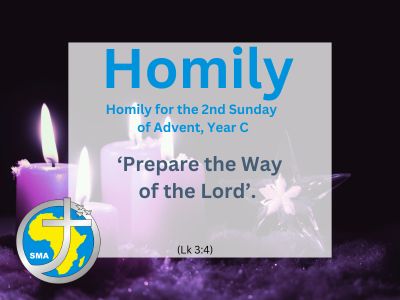Readings: Baruch 5:1-9; Philippians 1:4-6, 8-11; Luke 3:1-6
Theme: Prepare the Way of the Lord
Advent is not a penitential season in the same sense that Lent is. Joyful hope rather than penance is its keynote, as today’s Scripture readings illustrate. Nevertheless, we are called to repentance. The voice of John the Baptist rings in our ears: Prepare a way for the Lord. Make his paths straight’ (Lk 3:4). Preparing a way for the Lord and experiencing the joy of salvation are inseparably linked. They are two sides of the one coin. While we have begun to live the joy of the Gospel, we remain pilgrims ón the way, ‘hoping to reach the perfect goodness which Jesus Christ produces in us for the glory and praise of God’ (Phil 1:11).
In our first reading, the Prophet Baruch proclaims a message of hope to the Jews who were living in exile in Babylon. The Exile (in the 6th century BC) was a particularly traumatic experience for a people who thought of themselves as specially chosen by God. They had lost everything they held precious, their freedom and the things that gave them a sense of identity as a people: their homeland and Temple. Their most cherished hopes had been crushed. It seemed that God had forgotten or abandoned them. Psalm 137 captures their feelings of dejection and abandonment: ‘By the waters of Babylon, there we sat and wept, remembering Sion; on the poplars that grew there we hung up our harps’ (vv 1-2).
Baruch assures the exiles that God has not forgotten them, and that he will soon return to lead them back to their homeland and restore their fortunes. Thus, Jerusalem will once again become a city of joy, peace and integrity: ‘Jerusalem, take off your dress of sorrow and distress, put on the beauty of the glory of God forever, wrap the cloak of the integrity of God around you…: since God means to show your splendour to every nation under heaven’ (Bar 5:1-3). These words must have been music to the ears of the long-suffering and disheartened exiles. They are meant to be music to our ears, too, for Baruch’s message of hope is as relevant today as it was when he lived.
While our circumstances are very different from those of the poor and oppressed Jewish community Baruch is addressing, many people in Ireland today are living through a kind of exile. They no longer feel at ease in a country that has changed beyond recognition, and abandoned those traditions and values that gave many citizens a sense of identity and security. A priest friend of mine, who returned to Ireland a few years ago, after more than fifty years of missionary service in Africa, spoke to me of his sense sadness at the loss of so much that he held dear in these words: ‘I am back again in my homeland, but I no longer feel at home here. The Ireland I left in the 1970s is dead and buried’. So we, too, no less than the people of Israel, need to be reminded that, even if we have been unfaithful, God is ever faithful and will never abandon us.
Our gospel passage from Luke introduces us to the figure of John the Baptist, the precursor of Jesus Christ. John is presented, in words taken from the prophet Isaiah, as a ‘voice crying in the wilderness’, calling his contemporaries to repentance: ‘Prepare a way for the Lord, make his paths straight. Every valley will be filled in, every mountain and hill be laid low, winding ways will be straightened and rough roads made smooth’ (Lk 3:4-5). Today there is another prophetic voice calling on us to prepare a way for the Lord. It is the voice of Pope Francis exhorting us to take to heart the message of the Synod, recently concluded in Rome, after three years of listening, discernment and consultation throughout the Church.
Pope Francis is appealing to all of us to implement the recommendations of the Synod’s Final document and work together to create ‘a Church that is the servant of all;… a synodal and missionary Church; a Church that adores God and serves the women and men of our time, going forth to bring to everyone the consoling joy of the Gospel. ‘The mountains we need to remove today are the mountains of indifference and complacency. And the valleys that we must fill are the valleys of cynicism and fear of change. The need for humility and openness is illustrated in the following Zen story:
A Zen master invited a visitor to tea. The guest arrived, crossed his legs and sat in silence. The Zen Master then took the teapot and started to fill the cup. When he had filled it to the brim, he continued to pour until the tea was flowing over the saucer and on to the floor. The guest was horrified and enquired why the Zen master was so careless. ‘Because’, the master replied, I feel that your head is like this teacup – so full of certainty that it would be impossible for me to add anything to what you already know. You cannot hear what I say.’
Let us then, in response to the exhortation of Pope Francis, open our minds and hearts to the message of the Synod, allowing God’s Spirit to lead us into a new dawn for our Church and its mission in the service of humanity.
Listen to the audio version:

